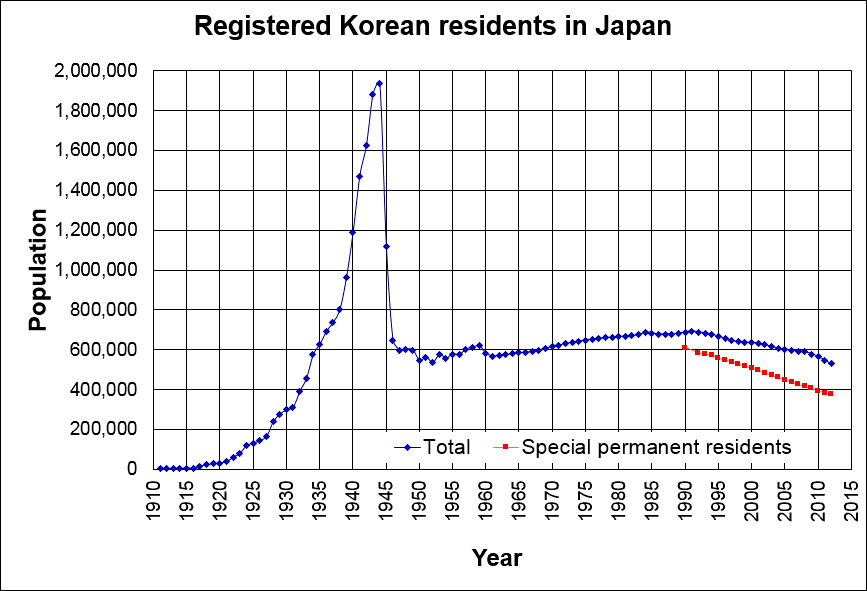|
Kazuki Kaneshiro
is a Zainichi Korean novelist who was born in Kawaguchi, Saitama. Later in his life he acquired Japanese citizenship. Due to early influence from his Marxist-Leninist father, he studied at the Chongryon-affiliated elementary school and middle school. Afterwards his father switched his affiliation for Mindan, he instead studied at Hozen High School (保善高等学校) in Tokyo Shibuya. He graduated in Law at Keio University. With the strong confusions with Chongryon, Mindan, and Japanese politics he wanted to promote an alternative "Korean-Japanese" (コリアン・ジャパニーズ) identity to overcome social obstacles, but later he abandoned this concept. Bibliography *2000 Go *2003 ''Taiwa-Hen'' (対話篇; made into a film as ''Ren'ai Shousetsu'') *2007 ''Eiga-Hen'' (映画篇) Zombies Series (ゾンビーズ・シリーズ) *2001 ''Revolution No. 3'' (レヴォリューションNO.3) *2003 ''Fly, Daddy, Fly'' (フライ,ダディ,フライ) *2005 ''SPEED'' Filmography ... [...More Info...] [...Related Items...] OR: [Wikipedia] [Google] [Baidu] |
Zainichi Korean
comprise ethnic Koreans who have permanent residency status in Japan or who have become Japanese citizens, and whose immigration to Japan originated before 1945, or who are descendants of those immigrants. They are a group distinct from South Korean nationals who have emigrated to Japan after the end of World War II and the division of Korea. They currently constitute the second largest ethnic minority group in Japan after Chinese immigrants, due to many Koreans assimilating into the general Japanese population. The majority of Koreans in Japan are , often known simply as , who are ethnic Korean permanent residents of Japan. The term Zainichi Korean refers only to long-term Korean residents of Japan who trace their roots to Korea under Japanese rule, distinguishing them from the later wave of Korean migrants who came mostly in the 1980s, and from pre-modern immigrants dating back to antiquity who may themselves be the ancestors of the Japanese people. The Japanese word "Zainic ... [...More Info...] [...Related Items...] OR: [Wikipedia] [Google] [Baidu] |
Living People
Related categories * :Year of birth missing (living people) / :Year of birth unknown * :Date of birth missing (living people) / :Date of birth unknown * :Place of birth missing (living people) / :Place of birth unknown * :Year of death missing / :Year of death unknown * :Date of death missing / :Date of death unknown * :Place of death missing / :Place of death unknown * :Missing middle or first names See also * :Dead people * :Template:L, which generates this category or death years, and birth year and sort keys. : {{DEFAULTSORT:Living people 21st-century people People by status ... [...More Info...] [...Related Items...] OR: [Wikipedia] [Google] [Baidu] |
People From Kawaguchi, Saitama
A person ( : people) is a being that has certain capacities or attributes such as reason, morality, consciousness or self-consciousness, and being a part of a culturally established form of social relations such as kinship, ownership of property, or legal responsibility. The defining features of personhood and, consequently, what makes a person count as a person, differ widely among cultures and contexts. In addition to the question of personhood, of what makes a being count as a person to begin with, there are further questions about personal identity and self: both about what makes any particular person that particular person instead of another, and about what makes a person at one time the same person as they were or will be at another time despite any intervening changes. The plural form "people" is often used to refer to an entire nation or ethnic group (as in "a people"), and this was the original meaning of the word; it subsequently acquired its use as a plural form of per ... [...More Info...] [...Related Items...] OR: [Wikipedia] [Google] [Baidu] |
Writers From Saitama Prefecture
A writer is a person who uses written words in different writing styles and techniques to communicate ideas. Writers produce different forms of literary art and creative writing such as novels, short stories, books, poetry, travelogues, plays, screenplays, teleplays, songs, and essays as well as other reports and news articles that may be of interest to the general public. Writers' texts are published across a wide range of media. Skilled writers who are able to use language to express ideas well, often contribute significantly to the cultural content of a society. The term "writer" is also used elsewhere in the arts and music, such as songwriter or a screenwriter, but also a stand-alone "writer" typically refers to the creation of written language. Some writers work from an oral tradition. Writers can produce material across a number of genres, fictional or non-fictional. Other writers use multiple media such as graphics or illustration to enhance the communication of thei ... [...More Info...] [...Related Items...] OR: [Wikipedia] [Google] [Baidu] |

_1938.jpg)
